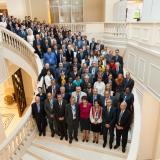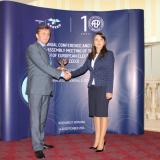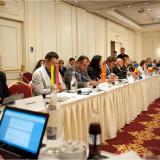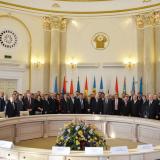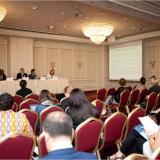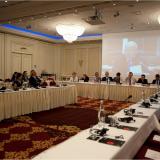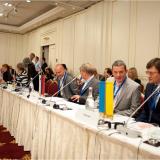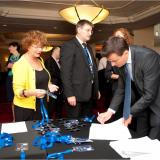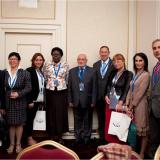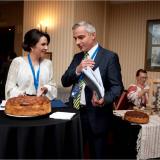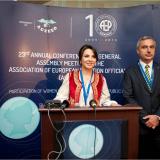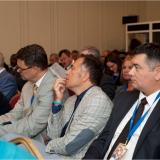Participation of women in electoral process and public life
Planning of a general election
Bucharest, Romania
4-6 September 2014
SIDE EVENT (in cooperation with Association of World Election Bodies) - GLOBAL AND REGIONAL TRENDS IN ELECTORAL MANAGEMENT
Chair: Mr. Zsolt Szolnoki, Secretary General, ACEEEO
Dr. Jung Ae Jang, System Manager, A-WEB
To read Dr. Jung Ae Jang’s presentation, please click here
Moderator: Mr. Richard W. Soudriette, President, Center for Diplomacy and Democracy
Speakers:
Mr. Kazimierz W. Czaplicki, Secretary, State Election Commission of Poland
To read Mr. Kazimierz W. Czaplicki presentation, please click here
Ms. Ilona Tip, Operations Director, Electoral Institute for the Sustainability of Democracy in Africa (EISA)
To read Ms. Ilona Tip presentation, please click here
Ms. Elizabeth Jenny Okello, Commissioner, Election Commission, Uganda
To read Ms. Elizabeth Jenny Okello presentation, please click here
Ms. Bushra Abu Shahout, Director of Policies and Institutional Development, Independent Election Commission of Jordan
To read Ms. Bushra Abu Shahout presentation, please click here
Mr. Manuel Carillo, Chief of Staff, International Affairs Unit, Instituto Nacional Electoral, Mexico
To read Mr. Manuel Carillo presentation, please click here
The side event focused on country specific and global trends in the field of election management. The panelists discussed topics including women involvement in election administration, election integrity, political finance, ICT in the election process, voter education, voter outreach efforts, the role of the judiciary in elections, participation of vulnerable groups, voter registration, and the application of election technology. The speakers provided an excellent overview of all these issues in their own countries and they also offered an overview of regional trends dealing with all of these topics. Also, discussed was an update on the progress of the Association of World Election Bodies which helped to sponsor the side event. The side event helped to set the stage for the official plenary sessions that dealt with women’s participation in the election and political process and the importance of election planning.
PLENARY SESSION I - PARTICIPATION OF WOMEN IN ELECTORAL PROCESS AND PUBLIC LIFE
Chair: Mr. Bill Sweeney, President/CEO, IFES
Speakers:
Ms. Amaya Ubeda de Torres, Legal Officer, Venice Commission
The Venice Commission has debated representation of genders in the electoral process since the time of the drafting of the Code of Good Practice in Electoral Matters. It has tackled issues such as representation of women in elected bodies and election management bodies as well as the improvement of women participation in the voting process.
Besides the Code of Good Practice in Electoral Matters which refers to gender quota, the Venice Commission developed its conception of parity in its Interpretative Declaration on Women’s Participation in Elections.
Another important document of the Venice Commission is the “Report on the impact of electoral systems on the representation of women in politics” which shows that the electoral system is obviously not without influence on the representation of women.
In theory, the most favorable combination would be: PR list systems in large constituencies and/or a nation-wide district, with legal threshold, closed lists and a mandatory quota which provides not only for a high proportion of female candidates, but also for strict rank-order rules and effective sanctions for non-compliance.
Ms. Ana Maria Pătru, ACEEEO President, President, Permanent Electoral Authority of Romania
Our world is coherent if men and women coexist and function as two halves of the same singularity. To ensure this vital gender balance means to bypass the causes that generate imbalance. If it is about discrimination, lack of regulations, disinterest of the political parties and authorities, than we can intervene by public policies. But if women under-representation is generated by wrong mentalities and education, then the solutions have to be much deeper and penetrate to the foundation of society. Romania is no exception from the European pattern, being under the average regarding the women involvement. A survey conducted by the Permanent Electoral Authority shows that the women presence in Parliament at the moment is twice as big as it was right after the fallen of the communist regime, but also twice as little then the average of 27% in European Union member states. PEA Romania intends to carry out a sustained campaign in order to stimulate women participation in elections. Our primary goal is to make women aware of the critical importance of elections and of the role they could play no matter how they get involved: voters, candidates, election officials or observers.
To read Ms. Ana Maria Pătru’s presentation, please click here
Ms. Ainura Shaiymkulova, Deputy Chairperson, Central Election Comission of the Kyrgyz Republic
The statistical researches showed that women in Kyrgyz Republic make more than a half of the population, therefore all spheres of activity of the country bear in themselves the "female nature". Equality and full participation of women in the political, social and economic life of the country is a necessary condition of successful economic development of the country, democratic character of the power, its openness and stability and world strengthening. Today, women reached the actual equality with men on level of the general and vocational education, however historically the political and economic spaces in the world in most cases belong to men. Women hold only 10% of seats in parliaments of the world and 6% in the national governments. The Kyrgyz Republic is one of the first among ten countries which successfully fulfill the obligations for the Beijing Platform for Action which represents one of the most important international documents on further development of gender equality.
To read Ms. Ainura Shaiymkulova’spresentation, please click here
Ms. Lefterije Luzi, Chairperson, Central Election Commission of Albania
The principle of gender equality in Albanian legal framework is foreseen by: the Albanian Constitution in the framework of the classic article of equality and non-discrimination; the Law on Gender Equality in the Society (2008) and the Electoral Code (2008), revised in 2012. The representation of women has not improved significantly so in 2012 amendments were made to the Electoral Code. The results were encouraging, subsequent elections showing an increase in the number of women involved in politics. The Albanian case demonstrates that having a quota can effect great change. CEC Albania identified vulnerabilities in the system in order to bypass gender quotas, the system of fines should be replaced by the rejection of the multi-name list of candidates in case of failure by the electoral subject to comply with gender quota. These issues will be address in the upcoming electoral reform agenda.
To read Ms. Lefterije Luzi’spresentation, please click here
Ms. Tamar Zhvania, Chairperson, Central Election Commission of Georgia
According to the UN’s Gender Inequality Index, Georgia is placed 71 of the 137 countries surveyed. According to public opinion survey carried out in 2013, over 40 % of Georgians believe that the gender of a candidate makes no difference in the electability, while 16 % said they would prefer to vote for a woman, 67% of Georgians support a quota-based system. The number of women in parliament and local government does not exceed 11 %, so there is enough space for improvement of the situation. The CEC’s training center developed a training module specifically tailored to women candidates for the 2014 local elections. 85 potential women candidates participated in the trainings organized by the CEC Training Center, 14 women out of the 85 were elected to local municipalities. The CEC will continue to offer gender specific trainings to all members of the election administration to raise awareness on gender equality.
To read Ms. Tamar Zhvania’spresentation, please click here
Ms. Irena Hadžiabdić, Member, Central Election Commission of Bosnia and Herzegovina
In the 2014 General Elections, 42.28 % of candidates were women, but the number of elected female representatives in legislative and representative bodies didn’t increase. Statistical data show that the number of women who vote (around 49 %), women who candidate (35-36 %) and those who are elected (15-17 %), was kept fairly constant between 2002 and 2012. In the legislative government of Bosnia and Herzegovina the situation of women representation changed dramatically, in the House of Representatives of Parliamentary Assembly of BIH (from 2.3 % in 1996 to 21.4 % in 2010), in the National Assembly of Srpska Republic (from 2.4 % in 1996 to 21.68 % in 2010) and in the House of representatives of BiH Federation Parliament (from 5 % in 1996 to 17.35 % in 2010). The numbers are still low but the government and CEC BiH make every effort to improve the situation.
To read Irena Hadžiabdić’spresentation, please click here
PLENARY SESSION II - PLANING OF A GENERAL ELECTION
Chair: Mr. Branko Hrvatin, Chairman, State Election Commission of Croatia
Speakers:
Ms. Nicola Schmidt, Deputy Head, Election Department, OSCE/ODIHR
ODIHR carries out election observation in OSCE participating States to assess the extent to which elections respect fundamental freedoms and are characterized by equality, universality, political pluralism, confidence, transparency and accountability. A long-term, comprehensive, consistent and systematic election observation methodology has become the bedrock of ODIHR’s credibility in this field. The Office also supports authorities in their efforts to improve electoral processes and to follow up on recommendations by ODIHR election observation missions, by reviewing election-related legislation, providing technical expertise and supporting the activities of citizen observer groups.
To read Ms. Nicola Schmidt’s presentation, please click here
Mr. Tadjoudine Ali-Diabacte, Deputy Director, United Nations Electoral Assistance Division
The UN provides many different types of electoral assistance: technical assistance, operational support to planning and logistics, training for EMBs and judicial authorities, capacity building of civil society organizations, etc. Electoral assistance is provided only by mandate of the General Assembly or the Security Council, or upon a direct request from the Member State. The Electoral Assistance Division is the focal point of electoral assistance, coordinating the contribution of several UN entities and international organizations having strategic partnership with UN.
To read Mr. Tadjoudine Ali-Diabacte presentation, please click here
Mr. Andrey V. Baranov, Director, International Institute of Monitoring Democracy Development, IPA CIS Member Nations
International monitoring is an efficient instrument to ensure international legitimacy of the general elections. In the territory of CIS countries the Convention on Standards for Democratic Elections and Electoral Rights and Freedoms in CIS Member States adopted in Chisinau in 2002 constitutes the legal platform for monitoring elections. The International Institute of Monitoring Democracy Development, Parliamentarianism and Suffrage Protection for the Citizens of the IPA CIS Member Nations (IIMDD IPA CIS) was established in 2006 in order to monitor the elections on the territory of theCommonwealth.
To read Mr. Andrey V. Baranov’s presentation, please click here
Mr. Dan Vlaicu, Vice-President, Permanent Electoral Authority of Romania
Plans are prepared for four major elements of election process: (1) time management (2) financial resources (3) human resources (4) institutions and responsibilities. Plans are separately prepared for the pre-election period, the electoral period and the post-election period in the above four issues. When preparing and executing the plans the legal provisions are always considered. (Five separate laws regulate five different types of elections and prior to every election the Government a set of secondary legislation.) Organizing and conducting the Romanian elections is a concentrated effort of public institutions, magistrates and representatives of political parties.
To read Mr. Dan Vlaicu’spresentation, please click here
Mr. Pedro Colmenares Soto, Deputy Director General, Internal Policy and Electoral Processes, Ministry of the Interior, Spain
According to Organic Law 5/1985 on the General Election Regime (LOREG), in Spain there is not a unique EMB in charge of all electoral duties, but several Public Administration bodies that work in a coordinated way bringing about the different electoral management tasks, always under the supervision of the Electoral Administration. The Ministry of Interior plays an outstanding role in the electoral management and administration. Its responsibilities include the planning of electoral budget, the coordination of every administrative body that participates in the electoral procedure, etc.
To read Mr. Pedro Colmenares Soto’s presentation, please click here
To read the text of Mr. Soto's presentation, please follow the link
Mr. Subhi Jakupi, Vice-President, State Election Commission of Macedonia
Planning of elections is an inseparable part of the electoral cycle. Before performing the plans, workshops are organized to discuss all the tasks and the deadlines necessary to include in the plans. Operational plan includes the training and voters education duties, the registration of voters and the preparation of voter lists, the election campaign issues, the tasks in election day, the tabulation of results and other post-election duties. Electoral budget is prepared parallel with the preparation of the operational plan.
To read Mr. Subhi Jakupi’s presentation, please click here
ROUND-TABLE FOR MEMBERS ABOUT THE EXPERIENCES ON THE EUROPEAN PARLIAMANTARY ELECTIONS
Chair: Mr. Arnis Cimdars, Chairman, Central Election Commission of Latvia
Moderator: Mr. Tibor Vaszi, Policy Officer, DG Justice, European Commission
Discussion’s participants:
Mr. Kazimierz W. Czaplicki, Secretary, State Election Commission of Poland
Mr. Dušan Vučko, Director, State Election Commission of Slovenia
Mr. Branko Hrvatin, Chairman, State Election Commission of Croatia
Ms. Ivilina Aleksieva, Chairperson, Central Election Commission of Bulgaria
Ms. Ana Maria Pătru, Chairperson, Permanent Electoral Authority of Romania
Mr. Zenonas Vaigauskas, Chairman, Central Election Commission of Lithuania
The panel discussed about one of the main electoral events of 2014 were the 2014 EP elections. Three topics were analysed: the role of the national authorities in managing these elections, including on their role to inform and encourage participation and ensure access to the exercise of the right to vote. Second, the panel should discussed the novelties, ie. the new context in which these elections took place (economic crises, raising Euroscepticism etc), but also the answers the EU institutions gave in this new context, notably recommendation from the Commission and from the EP for better visibility of European parties and for nominating top-candidates. Finally, the panel touched upon the crucial issue of turnout. Representatives of national electoral bodies participating in the panel highlighted efforts to facilitate access to voting rights of the persons with disabilities; for citizens residing abroad and for young voters. The panel also discussed of the ever increasing role of modern IT tools in managing elections and the role social media in the campaign. Chair raised the problem of the updating of the electoral rolls in order to make efficient the exchange mechanism of data between MS. It was concluded that encouraging participation and facilitating access are key issues across the EU. Efforts are visible in this respect and actions were taken ahead of the 2014 EP elections.
WORKSHOPS
- PARTICIPATION OF WOMEN IN ELECTORAL PROCESS AND PUBLIC LIFE
Chair: Dr. Iurie Ciocan, Chairman, Central Election Commission of Moldova
Moderator: Mr. Cristian Alexandru Leahu, Head of Legislation, Parliament Liaison and Election Dispute Resolution Department, PEA Romania
Keynote speakers:
Ms. Rumbidzai Kandawasvika-Nhundu, Senior Programme Manager, International IDEA
Gender refers to socially constructed rather than biologically determined roles of women and men, as well as the relationships between them in a given society at a specific time and place, while sex refers to the biologically determined differences and roles. Emphasis was placed on key entry points to address gender balance, using the Electoral Cycle approach as well as on the practical side of implementing gender equality between women and men is essential especially in countries with young democracies.
To read Ms. Rumbidzai Kandawasvika-Nhundu’s presentation, please click here
Dr. Alenka Verbole, Senior Democratization Officer, OSCE Presence in Albania
The presentation centered on the long debated and controversial subject of electoral quotas for women's representation. Contesters argue that the introduction of the measure of electoral quotas is an artificial solution that does not produce a real balancing of the representation of women in public and political life. Also, electoral quotas would cause the advancement of women through the support of men and not by their qualities. The introduction of electoral quotas, however, is a viable solution especially for young democracies in countries that have only recently started to pay attention to women's involvement in politics. Even though the mechanism used is not perfect, the principle of electoral quotas is correct, and in some countries is the only chance for women to participate in public life.
To read Dr. Alenka Verbole’s presentation, please click here
Discussion
The debate that followed the presentations was both open and interactive, participants had the opportunity both to express their views, experiences and ask questions. The speakers were officials from Georgia, the Netherlands, Azerbaijan, South Africa, Uganda and Bosnia-Herzegovina. The main topics were referring to changing the electoral system to increase gender equality, the importance of local level compared to the national level to achieve a real gender balance and the need to reassess the role of electoral management bodies in solving this problem. Officials of African states, South Africa and Uganda have reported difficulties in interactions with media and that it provides no help in the efforts for ensuring gender equality. The representative from Bosnia-Herzegovina said that in the private media the messages may be displayed only through financial resources while in the public media the access is much more difficult.
Conclusion
The workshop ended with the adoption of the Bucharest Declaration on women's participation in electoral processes and public life and planning general election. The statement is a summary of the most important topics discussed at the Conference by the participants and contains commitments to continue the efforts to improve the situation of women's participation in public life. A real and stable progress in this area can be achieved only by involving all stakeholders, governments, electoral management bodies, political parties and civil society.
B. PLANNING OF A GENERAL ELECTION
Chair: Mr. Zenonas Vaigauskas, Chairman, Central Election Commission of Lithuania
Moderators: Mr. Tiberiu Csaba Kovacs, Secretary General, PEA Romania; Mr. István Zsuffa, Programme Director, ACEEEO
Keynote speakers:
Mr. Gregor Wenda, Deputy Head of Department, Federal Ministry of Interior of the Republic of Austria - Directorate-General of Legal Affairs - Department III/6 - Electoral Affairs
Three stages (pre-election period, election day, post-election period) of elections are thoroughly planned and prepared in Austria. According to the Austrian experiences a solid legal basis is a prerequisite for sound general elections. It is important to get prepared for large numbers of voters. Training of the members of the electoral bodies and sufficient public information are also a must. Specific treatment of vulnerable groups (e.g. persons with disabilities) must be considered. Subsidiarity should be allowed for local peculiarities.
To read Mr. Gregor Wenda’s presentation, please click here
Mr. Terry Ismael Tselane, Vice Chairperson, Electoral Commission of South Africa
After the first free elections in 1994 the Constitution decided about the establishment of the National Electoral Commission and the acts on electoral issues were passed subsequently. The Constitution stipulates that all elections must be based on a national common voter’s roll. For this purpose, voting district boundaries were determined using the Geographic Information System. Specialized barcode scanners (called Zip-Zip) are used to register voters. Current challenges are enforcement of the Code of Conduct and properly regulate and enforce the private campaign funding.
To read Mr. Terry Ismael Tselane’s presentation, please click here
Mr. Jenő Szép, Expert, ACEEEO
Organizing general election is a project management task. Utilizing an appropriate project management is a key to enhance the probability of completing projects on time, within budget and to deliver the product to the satisfaction of all stakeholders. Application of project management methodologies at organizing elections significantly contributes to the successful performance of an election process. However, project management is a profession; it requires skilled managers who are aware of the requirements of planning and performing large projects.
To read Mr. Jenő Szép’s presentation, please click here
Mr. Jean-Pierre Kingsley, honorary member of ACEEEO
In Canada the chief electoral officer is responsible in one person for the successful and fair conduct of elections. He is the contact point of all the participants of the electoral process (candidates, political parties, election officers, etc.). However, he is in permanent connection with the officials and other persons involved in the electoral process and their opinion is always requested before making decisions. Planning and preparing election calendar is a basic element of conducting elections and testing every solution before introducing them is a precondition of successful planning.
Mr. Manuel Carillo, Chief of Staff, International Affairs Unit, Instituto Nacional Electoral, Mexico
A good electoral planning allows organizing monetary and human resources. More efficiency gives more security and transparency in the whole electoral process. Good electoral planning requires to consider the stages of the electoral cycle: pre-electoral period, electoral period, post electoral period. Electoral planning has to also consider the constitutional and political system of the country and the types of electoral bodies. In Mexico in 2010 the General Council of the National Electoral Institute approved the Integral System of Institutional Planning, monitoring and Evaluation.
To read Mr. Manuel Carillo’s presentation, please click here
Discussion
Participants of a brief discussion stressed the importance of planning in the electoral procedure. Employment of professional project management methods and experts would significantly improve the quality of electoral administration the increases the credibility of elections.
 The topic of the conference was 'Participation of Women in Electoral Process and Public Life' and 'Planning of a General Election’. The framework was provided for the celebration of the 10 years anniversary of the Permanent Electoral Authority of Romania, too. According to our tradition, in the prospect of our annual conference the possibilities were suggested for regional and cross-regional consultations, networking as well as for learning on recent developments in election technology.
The topic of the conference was 'Participation of Women in Electoral Process and Public Life' and 'Planning of a General Election’. The framework was provided for the celebration of the 10 years anniversary of the Permanent Electoral Authority of Romania, too. According to our tradition, in the prospect of our annual conference the possibilities were suggested for regional and cross-regional consultations, networking as well as for learning on recent developments in election technology.

